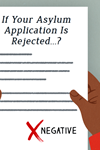Reform of the EU's return framework
The EU’s return framework covers rules on how the EU Member States should treat people without legal stay, such as rejected asylum seekers. The current legal instrument, the so-called Return Directive, applies to all EU Member States, except Ireland, and the Schengen associated countries.
With the aim to ensure a common EU return system for all EU Member States, the European Commission, in March 2025, presented a proposal for a new Return Regulation. The proposal will now be negotiated by the European Parliament and the Council.
The proposal can be seen as an extension of the agreement on the EU Pact on migration and asylum (the EU Pact) that was adopted in 2024, because it relates to the external dimension of EU asylum and migration policy.
DRC’s work with counselling on return and reintegration
Denmark has an opt-out from the area of Justice and Home Affairs, which means that only parts of the European asylum acquis apply to the Danish asylum system. However, Denmark is part of the Schengen cooperation and thus implements the EU return procedures.
DRC offers counselling throughout the Danish asylum procedure. We also provide counselling on return and reintegration support.
DRC works rights-based and with a purpose to ensure that rejected asylum seekers have access to thorough information about their situation and about the different choices and possibilities available to them. The aim is to support them in making informed decisions about their future.
DRC counsellors apply DRC’s return counselling methodology which is an approach that has been developed over several years to ensure a qualified and professional approach that addresses the complexity of return counselling. It is based on a deep professional understanding of a vulnerable and complex target group with different resources and challenges as well as a fundamental recognition of the difficult situations many asylum seekers face.
Read about DRC's position on dignified return
DRC reflections on key aspects of the proposed Return Regulation
Introduction of a European Return Order (art. 7 and 8)
With the EU Pact, decisions on asylum and return have become closely linked. Decisions on return must be mutually recognised and enforced by the EU Member States, regardless of where the rejected asylum seeker is staying. That means that if a rejected asylum seeker moves to another EU Member State, the second state must deport the person. With the introduction of a “European Return Order” as a digital registration of a return decision, it will be easier for the EU Member States to ensure that return orders are enforced.
Currently, the national asylum systems have very different capacity and the recognition rates for refugees are not harmonized. If the EU Member States are to enforce each other’s return decision, it is paramount that the EU Member States all have well-functioning asylum systems that safeguard the principle of non-refoulement.
Extended use of entry bans (art. 10 and art. 16)
The EU Member States get a wider possibility to issue entry bans, e.g. as sanction for not complying with the obligation to cooperate on the return procedure. The grounds for issuing entry bans due to security reasons have also been extended. The duration of the entry bans has been prolonged from five to ten years with possible further extension due to security concerns.
Increased use of entry bans can have serious consequences for rejected asylum seekers, especially people, who have family in the EU. It is thus paramount that rejected asylum seekers have access to effective remedies, including legal aid.
Limited possibility for voluntary return (art. 13)
The time limits for deciding to return voluntarily have been restricted. Any possible extension will depend on whether the authorities find that the rejected asylum seeker cooperates. The combination of short time limits and conditionality can cause rejected asylum seekers to be removed with force and without reintegration support, if the authorities do not find that their cooperation has been satisfactory.
A dignified return procedure should empower the rejected asylum seeker to make informed decisions about the future, including exploring pathways for legal stay or possibilities to get reintegration support upon return. It requires sufficient time for the rejected asylum seeker to make decisions about and preparations for “voluntary” return and reintegration.
New monitoring mechanism (art. 15)
The introduction of an independent monitoring mechanism to safeguard fundamental rights during the return process is a positive development.
For the scope to be meaningful, the full return process should be monitored, i.e. both the situation before departure or removal and after. It is essential that the monitoring is done by independent actors such as national human rights institutes, ombudsmen, or civil society actors. In case of violations, there must also be access to effective remedies to ensure accountability.
Legal basis for establishing return hubs in third countries (art. 4 and 17)
EU Member States will be allowed to remove a rejected asylum seeker to a third country if there is an agreement or arrangement for a so-called “return hub”. It means that the rejected asylum seeker can be deported to a third country, where the person has never been before, if the EU Member State has made such an agreement.
Schemes aimed at outsourcing responsibility for return of rejected asylum seekers to third countries contains risks of human rights violations. Return hubs can become “zones of exemption”, where fundamental rights are not respected, and people cannot access necessary services. The fact that unaccompanied minors and families with children are exempted from transfers to return hubs underlines the risks such schemes entail.
Additionally, such schemes aimed at forced removals are often characterized by extensive use of force and detention, thereby making them extremely expensive and ineffective, while also undermining the respect for human dignity in and around the EU.
Obligation to cooperate and sanctions for non-compliance (art. 21-22)
Rejected asylum seekers are obligated to cooperate with the authorities at all stages of the return procedure, e.g. remain available to the authorities and provide necessary information. The rejected asylum seeker can be sanctioned in case of non-compliance, e.g. limited possibility for voluntary return and reduced reintegration support as well as refusal of work permits.
However, there are still no binding rules on solutions for rejected asylum seekers, who cannot return despite their full cooperation with the authorities. Although the EU Member States can grant residence on compassionate or humanitarian grounds, they are not obligated to do so, which means that people risk staying in limbo for years.
Limited procedural safeguards (art. 25-28)
Procedural safeguards are weak, e.g. because there is no automatic suspensive effect of appeals. The rejected asylum seeker must apply for the suspension of the enforcement of the return decision as well as for free legal assistance and representation.
There is a risk of refoulement when a complaint does not automatically suspend the execution of the return decision. Even through it will also be possible to ask for assistance in relation to the asylum procedure, the access to free legal assistance will ultimately depend on the decisions of the authorities, which makes the safeguard seem inadequate.
Extended use of detention (art. 29-35)
The grounds for detaining rejected asylum seekers have been expanded, especially in relation to the “risk of absconding”. The length of detention has been extended from 18 months up to 24 months, with reviews at least every three months. It is still allowed to detain asylum seekers in prisons, if they are kept separately from prisoners convicted of crime.
As a counter measure, the EU Member States shall provide for “alternatives to detention”. But the incentive for the EU Member States to increase the use of alternatives to detention is not clear enough considering that the application is dependent on the risk of absconding that has been extended.
It is concerning that the possibility to detain children and families has been retained as detention will never be in the best interests of the child. DRC would like to stress that the use of detention should be limited to situations where it is necessary and proportionate. It is not a crime to apply for international protection.
Structures for return and reintegration counselling (art. 46)
The EU Member States have an enhanced obligation to set up structures for return and reintegration counselling. It is a positive development as access to meaningful and sufficient support can help ensure dignified return and sustainable reintegration.
Reintegration assistance is not recognised as an individual right, and the level of assistance depends on whether the rejected asylum seeker has cooperated and complied. Such conditionality in combination with the short deadlines to accept “voluntary” return can cause many rejected asylum seekers to be removed with force and without any reintegration support.
The possibility to get reintegration support should not be conditional upon whether a person has complied with the return procedure. Access to meaningful reintegration support is equally important regardless of whether the rejected asylum decides to cooperate on the return.









